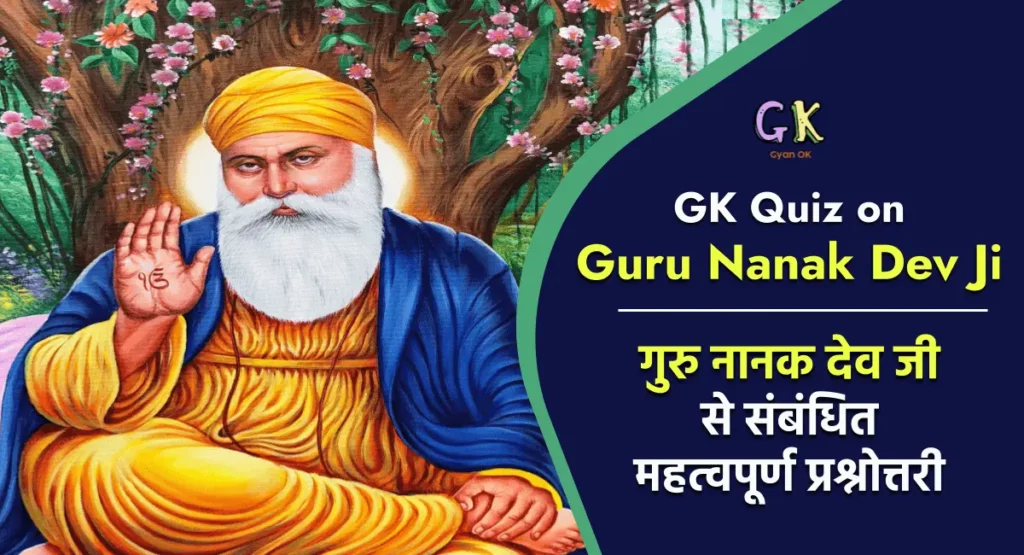Guru Nanak Dev Ji’s message of love and tolerance has inspired millions around the world to embrace a life of humility and righteousness. Today, his legacy continues to guide people on the path of spirituality and social justice. To honour his teachings, we have prepared a quiz that delves into Guru Nanak Dev Ji’s life and principles, allowing individuals to test their knowledge and deepen their understanding of this remarkable spiritual leader.

General Knowledge Quiz on Guru Nanak Dev Ji
Guru Nanak Dev Ji, born in the village of Talwandi, now known as Nankana Sahib in Pakistan, was the founder of Sikhism and a revered spiritual leader. His teachings emphasized the importance of equality, compassion, and the oneness of God, laying the foundation for Sikh philosophy. Every year, Sikhs and people of various faiths celebrate Guru Nanak Jayanti, also known as Gurpurab, to commemorate his birth. This joyous occasion is marked by prayers, hymn singing (kirtan), and langar (community meals) at gurdwaras (Sikh temples). It serves as a time to reflect on Guru Nanak Dev Ji’s timeless wisdom and his lifelong commitment to promoting peace, unity, and the welfare of all humanity.
We have prepared MCQs related to Guru Nanak Dev Ji to help you learn something new through this engaging process.
Q1. Guru Nanak Dev Ji was born in the village of:
A. Fatehgarh
B. Sultanpur
C. Talwandi
D. Kasabad
Answer: C
Q2. What were Guru Nanak Dev Ji’s sons’ names?
A. Sri Dharma
B. Sri Chand
C. Sri Jita
D. Sri Lakshmi Chand
Correct Answer(s): B. Sri Chand, D. Sri Lakshmi Chand
Q3. What was the purpose of Guru Nanak Dev Ji’s marriage?
A. His dad wanted him to stop Meditation.
B. His dad wanted him to become more responsible.
C. It was time to start his own family.
Answer: B
Q4. Why did Guru Nanak Dev Ji begin his journey?
A. To help the weak.
B. To make manjis.
C. To convey his message.
D. None of the above.
Answer: C
Q5. What is an “udasi”?
A. A sad time.
B. A journey.
C. Mist or smoke.
D. A sudden death.
Answer: B
Q6. What is the name of the river where Guru Nanak Ji disappeared and reappeared after three days?
A. Sutlej
B. The kali bein
C. Beas
D. Sarsa
Answer: B
Q7. What was the name of Guru Nanak Dev Ji’s wife?
A. Mata Sulakhni
B. Jito Mata
C. Nanaki
D. Mehta Kalu
Answer: A
Q8. How is Bebe Nanaki related to Guru Nanak Dev Ji?
A. She was his elder sister.
B. She was his younger sister.
C. She was his mother.
D. She was his aunt.
Answer: A
Q9. Who was the longtime companion of Guru Nanak Dev Ji?
A. Bhai Kalu
B. Bhai Arjuna
C. Sri Chand
D. Bhai Mardana
Answer: D
Q10. When did Guru Nanak Ji die?
A. 15 April 1539
B. 22 September 1540
C. 22 September 1539
D. 23 September 1539
Answer: C
Q11. What is the central place of worship for Sikhs where Guru Nanak Dev Ji spent a significant part of his life?
A. Harmandir Sahib (Golden Temple)
B. Akal Takht
C. Anandpur Sahib
D. Tarn Taran Sahib
Answer: A
Q12. Which musical instrument did Bhai Mardana play while accompanying Guru Nanak Dev Ji?
A. Tabla
B. Flute
C. Rabab
D. Harmonium
Answer: C
Q13. What is the name of the Sikh scripture that contains the teachings of Guru Nanak Dev Ji and subsequent Gurus?
A. Guru Granth Sahib
B. Guru Bani Sahib
C. Guru Vani Sahib
D. Guru Simran Sahib
Answer: A
Q14. What is the term used for the act of continuous reading of Guru Granth Sahib, which can take several days, typically performed during Sikh religious gatherings?
A. Akhand Path
B. Kirtan Sohila
C. Ardas
D. Sukhmani Sahib
Answer: A
Q15. What is the traditional Sikh greeting that means “God is the ultimate truth”?
A. Waheguru Ji Ka Khalsa, Waheguru Ji Ki Fateh
B. Sat Sri Akal
C. Namaste
D. Jai Hind
Answer: B
Q16. Guru Nanak Dev Ji’s teachings emphasize the importance of:
A. Material wealth
B. Compassion and equality
C. Caste system
D. Rituals and ceremonies
Answer: B
Q17. What is the practice of sharing a meal with others, irrespective of their background or social status, in a Sikh Gurdwara called?
A. Langar
B. Prabhat Pheri
C. Ardas
D. Nagar Kirtan
Answer: A
Q18. Who is considered the founder of Sikhism?
A. Guru Amar Das
B. Guru Nanak Dev Ji
C. Guru Gobind Singh
D. Guru Tegh Bahadur
Answer: B
Q19. Guru Nanak Dev Ji’s teachings promoted:
A. Division among people
B. Conversion to Sikhism
C. Interfaith harmony and equality
D. A strict code of conduct
Answer: C
Q20. Which festival is celebrated to mark the release of Guru Hargobind Ji from imprisonment, coinciding with Diwali?
A. Gurpurab
B. Baisakhi
C. Bandi Chhor Divas
D. Lohri
Answer: C
Q21. What is the name of the ceremony that marks the initiation of a Sikh into the Khalsa community, involving the “Five Ks”?
A. Amrit Sanchar
B. Guru Purnima
C. Diwali
D. Vaisakhi
Answer: A
Q22. Guru Nanak Dev Ji’s teachings promote the concept of “Naam Japna.” What does “Naam Japna” refer to?
A. Fasting
B. Chanting the name of God
C. Pilgrimage
D. Charity
Answer: B
Q23. In which city is the Harmandir Sahib (Golden Temple), one of the most sacred Sikh shrines, located?
A. Amritsar
B. Delhi
C. Chandigarh
D. Lahore
Answer: A
Q24. What is the name of the holy book that was compiled and installed as the eternal Guru by Guru Gobind Singh Ji?
A. Guru Granth Sahib
B. Guru Bani Sahib
C. Guru Vani Sahib
D. Guru Simran Sahib
Answer: A
Q25. Which Guru is known for founding the city of Amritsar and constructing the Harmandir Sahib (Golden Temple)?
A. Guru Nanak Dev Ji
B. Guru Angad Dev Ji
C. Guru Amar Das Ji
D. Guru Ram Das Ji
Answer: D
Q26. What is the term for the Sikh practice of reading and reflecting on Gurbani (the teachings in Guru Granth Sahib)?
A. Nitnem
B. Ardas
C. Anand Karaj
D. Seva
Answer: A
Q27. Which Sikh Guru composed the Japji Sahib, a sacred composition that forms the opening of Guru Granth Sahib?
A. Guru Amar Das Ji
B. Guru Nanak Dev Ji
C. Guru Angad Dev Ji
D. Guru Arjan Dev Ji
Answer: B
Q28. What is the name of the traditional Sikh martial art?
A. Karate
B. Gatka
C. Judo
D. Taekwondo
Answer: B
Q29. Which Guru introduced the Gurmukhi script and established it as the written script of the Sikh religion?
A. Guru Hargobind Ji
B. Guru Angad Dev Ji
C. Guru Tegh Bahadur Ji
D. Guru Gobind Singh Ji
Answer: B
Q30. What is the Sikh term for voluntary community service or selfless service?
A. Sangat
B. Seva
C. Simran
D. Amrit
Answer: B
Biography of Guru Nanak Dev Ji
Guru Nanak Dev Ji, the founder of Sikhism and a revered spiritual leader, was born on April 15, 1469, in the village of Talwandi, now known as Nankana Sahib, in present-day Pakistan. His life journey was marked by profound spiritual insights, a commitment to social justice, and a tireless quest for the divine truth.
Guru Nanak’s early life was filled with a sense of curiosity and a deep yearning for spiritual knowledge. Even as a child, he displayed a unique wisdom and an inclination towards meditation. He was known for his deep contemplation of the mysteries of life and his ability to engage in profound conversations with both the young and the elderly.
At the age of 30, Guru Nanak embarked on a transformative spiritual journey that would shape the course of his life and the destiny of millions. He undertook long journeys, known as “udasis,” to various parts of India and beyond, spreading his message of love, unity, and devotion to the one God. During these travels, he engaged in profound dialogues with sages, scholars, and people from diverse backgrounds, challenging prevailing religious dogmas and emphasizing the universality of divine truth.
One of Guru Nanak’s most iconic moments occurred at the age of 38 when he emerged from a three-day immersion in the Kali Bein River, revealing that he had received a divine revelation. He uttered the famous words, “There is no Hindu, there is no Muslim,” emphasizing the oneness of all humanity and the futility of religious divisions. This incident marked the formal beginning of his mission to promote interfaith harmony and the worship of the one true God.
Guru Nanak’s teachings, captured in hymns and verses, emphasized the importance of Naam Simran (meditation on God’s name), selfless service (seva), and living a life of righteousness. He fiercely criticized the oppressive caste system, social inequality, and ritualistic practices prevalent in society. Instead, he advocated for a simple and truthful way of life.
Throughout his journeys, Guru Nanak was accompanied by his devoted companion, Bhai Mardana, a Muslim minstrel who played the rabab (a stringed musical instrument). Together, they sang hymns and spread the message of equality and unity. This unique companionship symbolized Guru Nanak’s vision of transcending religious boundaries and fostering interfaith understanding.
Guru Nanak’s impact extended beyond his spiritual teachings. He established the concept of langar, a community kitchen that served free meals to people of all backgrounds, irrespective of caste or creed. This practice aimed to break down social barriers and promote equality and humility.
As Guru Nanak continued his travels, his reputation as a spiritual leader and reformer grew, attracting a diverse following. His teachings found resonance among people of various faiths, and his message of oneness began to permeate society.
Guru Nanak’s final journey took him to Kartarpur, where he settled and continued to guide his followers. He spent the later years of his life farming and working on communal projects. His humility and compassion endeared him to those around him, and he continued to compose hymns that would later become an integral part of the Guru Granth Sahib, the holy scripture of Sikhism.
On September 22, 1539, Guru Nanak Dev Ji peacefully departed from this world, leaving behind a legacy of wisdom, compassion, and a profound spiritual transformation. His life and teachings laid the foundation for Sikhism, a monotheistic religion that continues to emphasize the values of equality, justice, and devotion to the one Creator.
Important Teachings of Guru Granth Sahib
The Guru Granth Sahib, the central religious scripture of Sikhism, contains profound teachings that guide Sikhs on their spiritual journey and offer insights for leading a virtuous and meaningful life. Here are some of the important teachings of the Guru Granth Sahib:
- Oneness of God: The Guru Granth Sahib emphasizes the concept of “Ik Onkar,” which means there is one God who is the Creator of all, and everything in the universe is a manifestation of the Divine. Sikhism teaches monotheism and the belief in the formless, all-pervading God.
- Equality: Sikhism strongly advocates the equality of all human beings, regardless of their caste, gender, race, or social status. The Guru Granth Sahib rejects discrimination and inequality and emphasizes that all are equal in the eyes of God.
- Selfless Service (Seva): Service to humanity is a fundamental Sikh principle. Sikhs are encouraged to engage in selfless service to help those in need, whether it’s through langar (community kitchen), volunteering, or acts of kindness. Seva promotes humility and compassion.
- Simran (Meditation and Remembrance): Sikhs are encouraged to engage in meditation and the continuous remembrance of God’s name (Naam Simran). Through simran, individuals can develop a deep spiritual connection, purify their minds, and overcome ego.
- Truth (Sat): Truthfulness and honesty are highly valued in Sikhism. The Guru Granth Sahib emphasizes living truthfully, speaking the truth, and conducting oneself with integrity in all aspects of life.
- Contentment (Santokh): Sikhs are taught to be content with what they have and not to covet or be consumed by desires for material wealth. Contentment leads to inner peace and detachment from materialism.
- Compassion (Daya) and Forgiveness (Kshama): Compassion and forgiveness are central virtues in Sikhism. The Guru Granth Sahib teaches that individuals should show kindness and forgiveness to all, even in the face of wrongdoing.
- Humility (Nimrata): Humility is considered a key virtue in Sikhism. Sikhs are encouraged to shed ego and pride and to approach life with humility and a sense of servitude.
- Living in God’s Will (Hukam): Sikhs are taught to accept and surrender to God’s divine will (hukam). This concept emphasizes that everything happens as per God’s plan, and individuals should live in accordance with that plan.
- Freedom of Religion: Sikhism upholds the freedom of individuals to practice their chosen religion and beliefs. The Guru Granth Sahib respects the diversity of spiritual paths while emphasizing the Sikh path.
- Importance of Sangat and Pangat: Sangat refers to the company of a spiritual community, and Pangat refers to the community kitchen where all individuals, regardless of their background, sit together to share a meal. These practices promote unity, humility, and equality.
- Rejecting Ritualism: The Guru Granth Sahib critiques empty rituals and emphasizes that true spirituality lies in devotion, love, and sincere worship of God, rather than in external ceremonies.
- Noble Conduct (Karam): Sikhs are encouraged to lead a life of noble conduct, which includes honesty, kindness, and fairness in all interactions with others.





